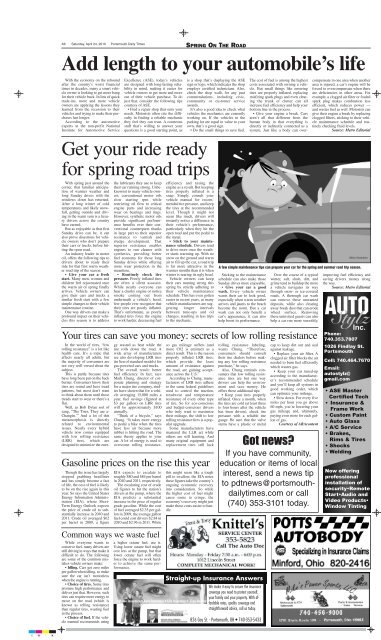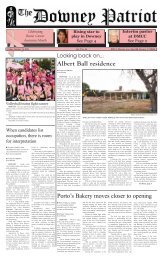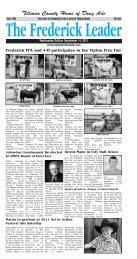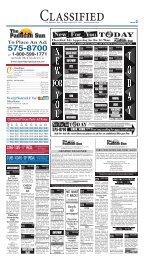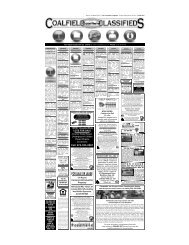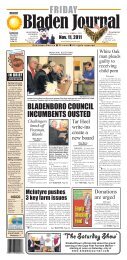1 Front&Jump RECYCLE - Radiate Media
1 Front&Jump RECYCLE - Radiate Media
1 Front&Jump RECYCLE - Radiate Media
You also want an ePaper? Increase the reach of your titles
YUMPU automatically turns print PDFs into web optimized ePapers that Google loves.
C M Y K<br />
A6 Saturday, April 24, 2010 Portsmouth Daily Times<br />
With spring just around the<br />
corner, that familiar anticipation<br />
of warmer weather and<br />
long Sunday drives with the<br />
windows down has returned.<br />
After a long winter of cold<br />
temperatures and likely snowfall,<br />
getting outside and driving<br />
in the warm sum is a luxury<br />
drivers across the country<br />
have earned.<br />
But as enjoyable as that first<br />
Sunday drive can be, it can<br />
also prove disastrous for vehicle<br />
owners who don’t prepare<br />
their cars or trucks before hitting<br />
the open road.<br />
An industry leader in motor<br />
oil, offers the following tips to<br />
drivers about to ready their<br />
ride for that first warm weather<br />
road trip of the season.<br />
• Give your car a fresh<br />
start. Many men, women and<br />
children feel rejuvenated once<br />
the warm air of spring finally<br />
arrives. Vehicle owners can<br />
give their cars and trucks a<br />
similar fresh start with a few<br />
simple changes to their vehicle<br />
maintenance routine.<br />
One way drivers can make a<br />
profound impact on their vehicles<br />
this season is to address<br />
In the world of tires, “low<br />
rolling resistance” is a lot like<br />
health care. It’s a topic that<br />
affects nearly all adults, but<br />
the majority of consumers are<br />
not very well versed about the<br />
subject.<br />
This is partly because tires<br />
have long been put on the back<br />
burner. Consumers know their<br />
tires are round and have tread<br />
patterns, but most don't want<br />
to think about them until those<br />
treads start to wear or there's a<br />
flat.<br />
Well, as Bob Dylan sort of<br />
sang, “The Tires, They are a-<br />
Changin.’” And a lot of this<br />
metamorphosis is directly<br />
related to environmental<br />
issues. Nearly every hybrid<br />
vehicle now comes equipped<br />
with low rolling resistance<br />
(LRR) tires, which are<br />
designed to minimize the ener-<br />
Though the issue has largely<br />
stopped grabbing headlines<br />
and has simply become a fact<br />
of life, the cost of fuel is likely<br />
to be on the rise again in this<br />
year. So says the United States<br />
Energy Information Administration<br />
(EIA), whose Short-<br />
Term Energy Outlook expects<br />
the price of crude oil to substantially<br />
increase in 2010 and<br />
2011. Crude oil averaged $62<br />
per barrel in 2009, a figure<br />
While everyone wants to<br />
conserve fuel, many drivers are<br />
still driving in ways that make it<br />
difficult to do. The following<br />
are some of the common mistakes<br />
vehicle owners make:<br />
• Idling. Cars get zero miles<br />
per gallon when idling, so make<br />
sure the car isn’t motionless<br />
when the engine is running.<br />
• Choice of tires. Some tires<br />
promise high performance and<br />
deliver just that. However, such<br />
tires can require more energy to<br />
move on the road (which is<br />
known as rolling resistance)<br />
than regular tires, wasting fuel<br />
in the process.<br />
• Choice of fuel. If the vehicle<br />
manual recommends using<br />
the lubricants they use to keep<br />
their car running strong. Unbeknownst<br />
to many vehicle owners,<br />
conventional motor oils<br />
slow starting rpm while<br />
restricting oil flow to critical<br />
engine parts and increasing<br />
wear on bearings and rings.<br />
However, synthetic motor oils<br />
provide significant performance<br />
benefits over their conventional<br />
counterparts thanks<br />
in large part to their superior<br />
resistance to varnish and<br />
sludge development. That<br />
superior resistance enables<br />
engines to run cleaner with<br />
synthetics, providing better<br />
fuel economy for those long<br />
Sunday drives while offering<br />
more wear protection in the<br />
meantime.<br />
• Routinely check tire<br />
pressure. Poorly inflated tires<br />
are often a silent assassin.<br />
While nearly everyone can<br />
hear a clunky engine or notice<br />
smoke coming out from<br />
underneath a vehicle’s hood,<br />
few people ever recognize that<br />
their tires are poorly inflated.<br />
That’s unfortunate, as poorly<br />
inflated tires force the engine<br />
to work harder, decreasing fuel<br />
gy wasted as heat while the<br />
tire rolls down the road. A<br />
wide array of manufacturers<br />
are also developing LRR tires<br />
(in lieu of standard models) for<br />
gas-powered cars and trucks.<br />
The overall result: better<br />
fuel efficiency. In fact, says<br />
Mark Chung, director of corporate<br />
planning and strategy<br />
for a major tire company, studies<br />
have shown that for a vehicle<br />
averaging 15,000 miles a<br />
year, fuel savings (figured at<br />
$3 per gallon) on LRR tires<br />
will be approximately $100<br />
annually.<br />
“Think of a bicycle,” says<br />
Chung. “It takes more energy<br />
to pedal a bike when the tires<br />
have less air because more<br />
rubber is hitting the road. The<br />
same theory applies to your<br />
car. A lot of energy is used to<br />
overcome rolling resistance,<br />
EIA expects to escalate to<br />
roughly $80 and $84 per barrel<br />
in 2010 and 2011, respectively.<br />
The escalating cost of crude<br />
oil figures to hit the nation’s<br />
drivers at the pump, where the<br />
EIA predicts a substantial<br />
increase in the price of regular<br />
grade gasoline. While the cost<br />
of fuel averaged $2.35 per gallon<br />
in 2009, the average gallon<br />
fuel could cost drivers $2.84 in<br />
2010 and $2.96 in 2011. While<br />
a higher octane fuel, use it.<br />
Using lower octane fuel might<br />
cost less at the pump, but that<br />
lower octane fuel will often<br />
force the engine to work harder<br />
to achieve the same performance.<br />
SPRING ON THE ROAD<br />
Add length to your automobile’s life<br />
With the economy on the rebound<br />
after the country’s worst financial<br />
times in decades, many a smart vehicle<br />
owner is looking to get more bang<br />
for their vehicle buck. In lieu of quick<br />
trade-ins, more and more vehicle<br />
owners are applying the lessons they<br />
learned from the recession to their<br />
vehicles and trying to make their purchases<br />
last longer.<br />
According to the automotive<br />
experts at the non-profit National<br />
Institute for Automotive Service<br />
Excellence (ASE), today’s vehicles<br />
are designed with long-lasting reliability<br />
in mind, making it easier for<br />
vehicle owners to get more and more<br />
out of their vehicle purchase. To do<br />
just that, consider the following tips<br />
courtesy of ASE.<br />
• Find a repair shop that suits your<br />
needs. Motorists often cite the difficulty<br />
in finding a reliable mechanic<br />
they feel they can trust. A courteous<br />
staff that’s willing to answer your<br />
questions is a good starting point, as<br />
Get your ride ready<br />
for spring road trips<br />
efficiency and taxing the<br />
engine as a result. But keeping<br />
tires properly inflated is a<br />
snap. Simply consult your<br />
vehicle manual for recommended<br />
tire pressure, and keep<br />
the tires at the recommended<br />
level. Though it might not<br />
seem like much, drivers will<br />
instantly notice a difference in<br />
their vehicle’s performance,<br />
particularly when they hit the<br />
open road and put the pedal to<br />
the metal.<br />
• Stick to your maintenance<br />
schedule. Drivers tend<br />
to drive more once the weather<br />
starts warming up. With no<br />
snow on the ground and warm<br />
air to fill up the car, a road trip<br />
is far more attractive in the<br />
warmer months than it is when<br />
winter is rearing its ugly head.<br />
Vehicle owners can keep<br />
their cars running strong this<br />
spring by strictly adhering to<br />
their vehicle maintenance<br />
schedule. This has even gotten<br />
easier in recent years, as many<br />
vehicle manufacturers are suggesting<br />
longer intervals<br />
between tune-ups and oil<br />
changes, resulting in less trips<br />
to the mechanic.<br />
so gas mileage suffers (and<br />
more C02 is emitted) as a<br />
direct result. This is the reason<br />
properly inflated LRR tires,<br />
which provide the least<br />
amount of resistance against<br />
the road, are gaining acceptance<br />
across the U.S.”<br />
According to Chung, manufacturers<br />
of LRR tires adhere<br />
to the same federal guidelines<br />
used to control the traction,<br />
treadwear and temperature<br />
resistance of every other type<br />
of tire. So for eco-conscious<br />
and budget-conscious drivers<br />
who truly want to maximize<br />
their mileage, the shift to low<br />
rolling resistance tires is a popular<br />
upgrade.<br />
Some manufacturers have<br />
mastered the LLR art while<br />
others are still learning. And<br />
many original equipment and<br />
replacement tires still lack<br />
this might seem like a tough<br />
pill to swallow, the EIA notes<br />
these figures take the country’s<br />
ongoing economic recovery<br />
into consideration. So while<br />
the higher cost of fuel might<br />
cause some to cringe, the<br />
economy’s recovery might just<br />
make those costs easier to handle.<br />
• Home Insurance • Auto Insurance • Life Insurance • Free Quotes<br />
is a shop that’s displaying the ASE<br />
sign or logo, which indicates the shop<br />
employs certified technicians. Also,<br />
check the shop walls for any past<br />
commendations, including civic,<br />
community or customer service<br />
awards.<br />
It’s also a good idea to check what<br />
vehicles the mechanics are currently<br />
working on. If the vehicles in the<br />
parking lot are equal in value to your<br />
own, that’s a good sign.<br />
• Do the small things to save fuel.<br />
Sticking to the maintenance<br />
schedule can also make those<br />
Sunday drives more enjoyable.<br />
• Give your car a good<br />
wash. Every vehicle owner<br />
wants their car to look good,<br />
especially when warm weather<br />
arrives and jaunts to the beach<br />
become the norm. But a car<br />
wash can not only benefit a<br />
car’s appearance, it can also<br />
help boost its performance.<br />
rolling resistance labeling,<br />
warns Chung. “Therefore,<br />
consumers should consult<br />
their tire dealers before making<br />
any low rolling resistance<br />
purchase,” he says.<br />
Also, Chung reminds consumers<br />
that low rolling resistance<br />
tires are but one way<br />
drivers can help the environment<br />
and save money. He<br />
offers these additional tips:<br />
• Keep your tires properly<br />
inflated. Once a month, when<br />
the tires are cold (at least three<br />
to four hours after the vehicle<br />
has been driven), check tire<br />
pressure with a reliable tire<br />
gauge. Be sure that the valve<br />
stems have a plastic or metal<br />
Straight-up Insurance Answers<br />
We make it easy to secure the insurance<br />
coverage you need to protect yourself,<br />
your family and your property. With affordable<br />
rates, quality coverage and<br />
straightforward advice, call us today.<br />
826 Gay St. - Portsmouth, OH • 740-353-5433<br />
The cost of fuel is among the highest<br />
costs associated with owning a vehicle.<br />
But small things like ensuring<br />
tires are properly inflated, replacing<br />
misfiring spark plugs and even clearing<br />
the trunk of clutter can all<br />
increase fuel efficiency and help your<br />
bottom line in the process.<br />
• Give your engine a break. Cars<br />
aren’t all that different from the<br />
human body in that everything is<br />
directly or indirectly connected as a<br />
system. Just like a body can over-<br />
Over the course of a typical<br />
winter, salt, slush, dirt, and<br />
grime tend to buildup the more<br />
a vehicle navigates its way<br />
through snow- or ice-covered<br />
roads. A thorough car wash<br />
can remove these unwanted<br />
deposits, while also clearing<br />
away break dust that can erode<br />
wheel surface. Removing<br />
these uninvited guests can also<br />
help a car run more smoothly,<br />
cap to keep dirt out and seal<br />
against leakage.<br />
• Replace your air filter. A<br />
clogged air filter blocks the air<br />
needed to burn fuel efficiently<br />
which wastes gas.<br />
• Keep your car tuned-up<br />
according to the manufacturer’s<br />
recommended schedule<br />
and you’ll keep all systems in<br />
good working order, which<br />
can optimize your mileage.<br />
• Slow down. For every five<br />
miles per hour you go above<br />
60 mph, you’re lowering your<br />
gas mileage and, ultimately,<br />
paying even more for each gallon<br />
of gas.<br />
Courtesy of ARAcontent<br />
compensate in one area when another<br />
area is injured, a car’s engine will be<br />
forced to overcompensate when there<br />
are deficiencies in other areas. For<br />
example, a clogged air filter or fouled<br />
spark plug makes combustion less<br />
efficient, which reduces power —<br />
and wastes fuel as well. Motorists can<br />
give their engine a break by replacing<br />
clogged filters, sticking to their vehicle<br />
maintenance schedule and routinely<br />
checking fluid levels.<br />
Source: Metro Editorial<br />
A few simple maintenance tips can prepare your car for the spring and summer road trip season.<br />
Your tires can save you money: secrets of low rolling resistance<br />
Gasoline prices on the rise this year<br />
Common ways we waste fuel<br />
Got news?<br />
If you have community,<br />
education or items of local<br />
interest, send a news tip<br />
to pdtnews@portsmouthdailytimes.com<br />
or call<br />
(740) 353-3101 today.<br />
Metro Illustration<br />
improving fuel efficiency and<br />
saving drivers money along<br />
the way.<br />
Source: Metro Editorial<br />
AUTO Stylz Inc.<br />
Phone:<br />
740.353.7807<br />
1026 Findlay St.<br />
Portsmouth<br />
Cell: 740.464.7670<br />
Email:<br />
autostylz@<br />
gmail.com<br />
• ASE Master<br />
Certified Tech<br />
• Insurance &<br />
Frame Work<br />
• Custom Paint<br />
• Auto Glass<br />
• A/C Service<br />
• Brakes,<br />
Rims & Tires<br />
• Shocks<br />
• Welding<br />
Now offering<br />
professional<br />
installation of<br />
security•Remote<br />
Start•Audio and<br />
Video Products•<br />
Window Tinting


